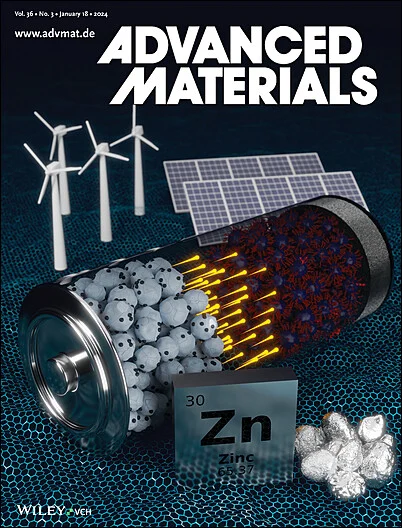超韧聚(尿素-氨基甲酸乙酯)塑料,具有优异的抗冲击性,适用于低温应用。
IF 26.8
1区 材料科学
Q1 CHEMISTRY, MULTIDISCIPLINARY
引用次数: 0
摘要
传统的抗冲击塑料在低温下会变脆,因为聚合物链的迁移性受到限制,使得它们不适合低温应用。开发在极端低温条件下具有优异抗冲击性能的超韧塑料仍然是一个重大挑战。在这里,本研究报告了通过多种类型的氢键和具有不同结合能的氢键聚集体,通过交联软聚(四亚甲基醚乙二醇)(PTMEG)链来制造超韧,耐冲击的聚氨酯(PUU)塑料。PUU塑料具有双连续相分离的纳米结构,其中氢键交联,刚性但可变形的结构域与软PTMEG链相互渗透。在-50℃时,该塑料的屈服强度为81.1 MPa,断裂强度为133.0 MPa,杨氏模量为1.5 GPa,断裂应变为220.9%,力学性能与常温下的超韧高强塑料相当。0.3 mm厚的样品在-50°C时的最大冲击力为667.8 N,冲击能为3.8 J,即使在-196°C时也能保持优异的机械坚固性和柔韧性。PUU塑料的低温韧性和抗冲击性能超过了现有的抗冲击塑料。这项研究表明,具有广谱结合能的氢键可以作为理想的交联,用于制造适用于低温应用的超韧、抗冲击塑料。本文章由计算机程序翻译,如有差异,请以英文原文为准。
Ultra-Tough Poly(Urea-Urethane) Plastics With Superior Impact Resistance for Cryogenic Applications.
Traditional impact-resistant plastics become brittle at low temperatures due to restricted polymer chain mobility, rendering them unsuitable for cryogenic applications. Developing ultra-tough plastics with superior impact resistance under extreme low-temperature conditions remains a significant challenge. Here, this study reports the fabrication of ultra-tough, impact-resistant poly(urea-urethane) (PUU) plastics by cross-linking soft poly(tetramethylene ether glycol) (PTMEG) chains through multiple types of hydrogen bonds and hydrogen-bond aggregates with varying binding energies. The PUU plastic features a bicontinuous phase-separated nanostructure, where hydrogen-bond-cross-linked, rigid yet deformable domains are interpenetrated with soft PTMEG chains. At -50 °C, the plastic exhibits mechanical properties comparable to those of ultra-tough, high-strength plastics at ambient temperature, with yield strength of 81.1 MPa, breaking strength of 133.0 MPa, Young's modulus of 1.5 GPa, and breaking strain of 220.9%. A 0.3-mm-thick sample achieves a maximum impact force of 667.8 N and an impact energy of 3.8 J at -50 °C, while maintaining exceptional mechanical robustness and flexibility even at -196 °C. The low-temperature toughness and impact resistance of the PUU plastics surpass those of existing impact-resistant plastics. This study demonstrates that hydrogen bonds with a broad spectrum of binding energies serve as ideal cross-links for fabricating ultra-tough, impact-resistant plastics suitable for cryogenic applications.
求助全文
通过发布文献求助,成功后即可免费获取论文全文。
去求助
来源期刊

Advanced Materials
工程技术-材料科学:综合
CiteScore
43.00
自引率
4.10%
发文量
2182
审稿时长
2 months
期刊介绍:
Advanced Materials, one of the world's most prestigious journals and the foundation of the Advanced portfolio, is the home of choice for best-in-class materials science for more than 30 years. Following this fast-growing and interdisciplinary field, we are considering and publishing the most important discoveries on any and all materials from materials scientists, chemists, physicists, engineers as well as health and life scientists and bringing you the latest results and trends in modern materials-related research every week.
 求助内容:
求助内容: 应助结果提醒方式:
应助结果提醒方式:


